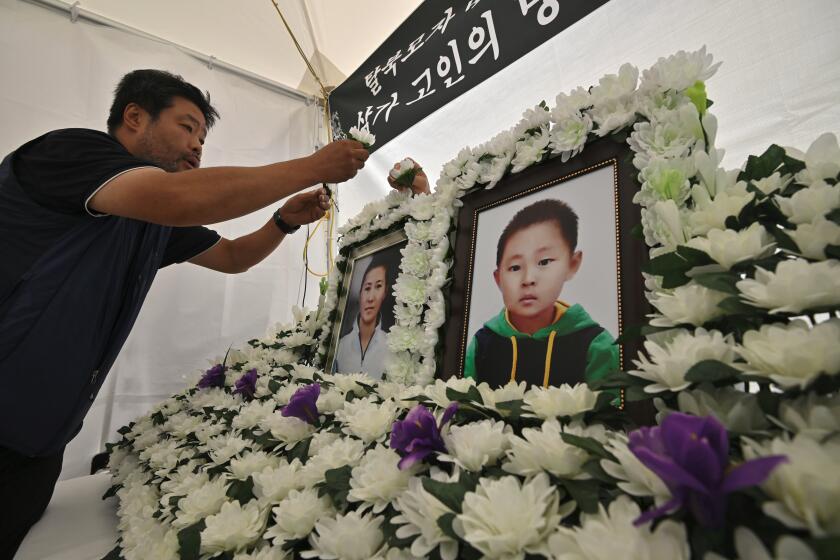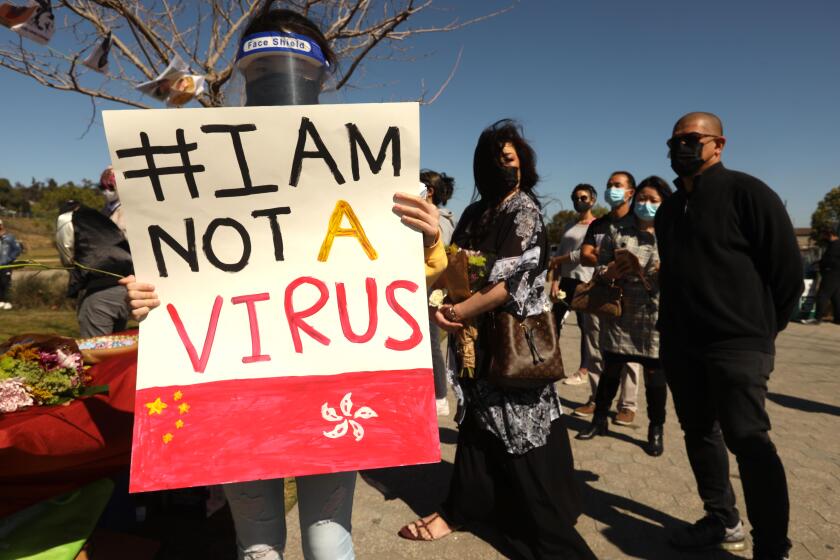- Share via
SEOUL — Yoon Seol Mi stepped off the plane in northeastern China clad in borrowed Nikes, ripped jeans and a cloud of Chanel perfume.
The trappings of capitalism, she hoped, would mask her origins: a North Korean woman traveling back to a remote Chinese village to reclaim the daughter she bore when she was a refugee and sold as a bride. Yoon was nearing the end of an odyssey marked by danger and loss and endless doubt of where to call home while her daughter was raised in another’s house.
Tens of thousands of her fellow countrywomen endure the same fate: escaping the poverty and oppression of a totalitarian regime and arriving into China only to be sold into forced marriage by brokers charging thousands of dollars. Most soon give birth to a child that for the Chinese families becomes a collateral of sorts, to ensure the women they’ve paid a hefty sum for won’t leave.
But Yoon did leave. Twice. The first time involuntarily when her daughter, Yena, was still breastfeeding at barely a month old. She was caught by Chinese police and sent back to North Korea. Then again years later when she decided to make the perilous journey to South Korea so she wouldn’t have to live in fear of being sent back again.
That second time, she promised her daughter she’d return for her if Yena didn’t cry. Now, with a suitcase full of pink outfits and a DNA test to prove the girl was hers, she was back to fulfill that promise.
“What choice did we have? Our choice was to survive,” she said. “My child was my purpose.... It was for her that I survived.”
::
The illicit trade of trafficking North Korean women became widespread in the early 2000s when a flood of refugees streamed into rural China after a devastating famine in North Korea. The surge unfolded just as China’s gender imbalance, caused by the draconian one-child policy and a cultural preference for sons, was coming to a head. Exploited and threatened, the women were funneled to remote corners of China by brokers eager to profit from a growing demand for brides.
In the eyes of the Chinese government, though, the women were illegal migrants and their children, even with Chinese fathers, nonexistent on paper.
But children born of trafficking are children all the same. For many of the women, their children are their only kin outside North Korea. And when the women weigh the prospect of fleeing to South Korea, where they’re granted automatic citizenship and resettlement support, they’re faced with a fraught choice: stay with their sons and daughters or leave to seek freedom and safety?
It’s a decision that haunts many of the 24,000 North Korean women who have settled in the South.
“I live with her buried in my heart always. There’s the constant guilt that I abandoned her,” said Joy Kim, who left her daughter behind two years after giving birth as a 19-year-old. “I want to tell all of the women living with guilt, it’s not their fault…. It’s the human trafficking that needs to stop. Crossing the border is just the first step in our long, difficult path to freedom.”
A survey by South Korea’s National Human Rights Commission in 2012 interviewed about 100 children born to North Korean refugees in China. The report found that a third of their mothers had been sent back to North Korea while a quarter of them had escaped to South Korea. The kids were an average of 3 or 4 years old when they were separated from their mothers.
A 2014 United Nations report on human rights in North Korea said an estimated 20,000 such children live in China, often deprived of the right to birth registration, nationality, education and healthcare. They are at once orphans and children of need, a product of China’s policies yet invisible to the state.
For the mothers, though, it’s a hardship — often an impossible one — to bring their children to South Korea. Many lack the financial means; child-care issues can preclude them from working. In some cases, the Chinese husband and his family cut off contact with the mothers after they leave. The children, who primarily speak Chinese, can have trouble adjusting to the language and culture of South Korea.
Left behind, some of the children never learn if their mothers have been sent back to North Korea, or made their way to the South.
::
A woman who now calls herself Yura has a 13-year-old son in China but hasn’t seen him in more than five years. The boy’s legal registration, obtained through a bribe, says his mother is dead.
In a farming village surrounded by mountains in Hebei province, Yura was 18 when she gave birth to her first son, a year after she was sold for about $2,500 to a man a dozen years her senior who grew volatile and abusive. Two years later, when she became pregnant with another, Yura tried jumping from high places on a nearby mountain, hoping she’d lose the baby. She gave birth to a healthy boy.
“I often thought, I’d rather die than live like this. I tried swallowing pills but woke up each time,” said Yura, who asked to only be identified by her adopted name in South Korea because of relatives still in the North. “I felt so sorry for the child. It would have been so much better for him not to have been born.”
She considered heading to South Korea but was held back by the thought of leaving her children. But life grew cruel: Her firstborn died in an accident when he tumbled into a well as an 8-year-old. A few years later, her Chinese husband pushed her into a furnace during a fight, leaving her with severe burns on her butt. She fled, journeying through China and into Laos, then Thailand, where she sought passage to South Korea.
“I live with her buried in my heart always. There’s the constant guilt that I abandoned her. I want to tell all of the women living with guilt, it’s not their fault…. It’s the human trafficking that needs to stop. Crossing the border is just the first step in our long, difficult path to freedom.”
— Joy Kim, who left her daughter behind in China
In her new home, she worked whatever jobs she could including in a shipyard, a kimchi factory, bars and restaurants. She spent much of that first year crying, missing the son she left behind.
“For many years, I lived because of him,” she said. “When I had him, I was so young, I didn’t really feel like a mother. I just thought, ‘Oh, what a beautiful baby.’”
In the five years since, she’s heard his voice deepen over the phone, a boy who’s grown into a teenager and tells her less and less about his life. Others in the village have told her he’s teased at school for not having a mother. She sends him money when she can, and thinks about bringing him to live with her in South Korea, but wonders if that’s selfish — he doesn’t speak Korean. All he knows is life in China.
She’s since remarried a fellow North Korean refugee, who didn’t like how much she cried about her son in China. Last year, she gave birth to a daughter. She cradled the baby in her arms, and quietly mourned all that she couldn’t be for the son she left behind.
::
Yoon understands how one can summon endurance amid cruelty. The thought of her daughter kept Yoon determined to stay alive during her five years in a North Korean prison after she was sent back in 2009.
She slept in cramped quarters with 70 women serving time for the crime of having crossed into China. Sixty of them had children on the other side of the border; and even in prison, the mothers bragged about their precocious sons and daughters. She grew close to a woman who had been taken away from China’s Jilin province while her daughter was in school. The woman was dying in the harsh conditions and forced labor of the prison.
In her final days, the woman begged Yoon to memorize a phone number. Please call my daughter, she implored. Tell her, her mother didn’t abandon her.
But Yoon was struggling to remember the long string of digits to reach her own daughter. Writing it down wasn’t an option — it would have been confiscated and she would have received fresh punishment. In the months and years that followed, all but the first four digits of the woman’s phone number scattered and scrambled in her mind, as did the numbers of several other women who asked the same favor.
It was a task too great, and even now, a decade later, she thinks she failed them.
“How much must the children resent their mothers?” said Yoon, now 36. “That guilt is always with me. If I could tell the children at least when and how their mothers died.”
After her release, Yoon again crossed into China and made her way back to Yena. But prison had made her a skeleton — she weighed 80 pounds at 5 feet tall. Her daughter was frightened at first, but soon became her shadow, not leaving her side.
Yoon knew that she and Yena would never have a future together in North Korea or China. So she left her daughter once more and struck out again, this time for South Korea.
::
So many women have such stories, even ones like Kim, who got one of her children out of China. Her oldest son was born in 2000 in a frigid village near the Russian border where she was sold into marriage for 10,000 yuan, about $1,200 at the time.
After she shattered her ankles jumping from a third-story window to escape Chinese police, Kim, 40, who asked to be identified only by her last name for the safety of family back in North Korea, made her way to South Korea in 2017, hoping for a better life. The next year, she brought over her now 18-year-old son.
Unable to speak Korean, he’s worked tough manual-labor jobs, collecting trash or working at construction sites, Kim said. He sends some of his earnings back to his childhood home in China to support his younger brother’s education.
She felt guilty for her decision to bring him to Korea after she contracted COVID-19 in late December at one of three part-time jobs she was working. Her entire family, including her son, also became infected.
Even though he recovered with barely any symptoms, his life has been hard. What scant work there was has dried up and he hasn’t been able to find jobs. Disabled from her fall, and with two young children from a later marriage to support, Kim cannot provide for him.
“We’ve been through so much just to get here, struggling to stay alive,” she said. “But it just feels like darkness ahead.”
::
Yoon packed and boarded a plane to China.
It was time to bring Yena home to South Korea. But the girl’s Chinese grandmother begged Yoon not to. Even though their bond started with a financial transaction, the grandparents had always been kind to her and even paid for her passage to South Korea, wanting her to be safe from deportation to North Korea.
The woman’s son, the man who became Yoon’s husband through trafficking, had died of meningitis. Yena was the grandparents’ only connection to him. The grandmother urged Yoon to go — to start fresh alone in South Korea. Yoon would not relent; too many years had already passed living without the child she bore.
“What choice did we have? Our choice was to survive. My child was my purpose.... It was for her that I survived.”
— Yoon Seol Mi
They decided to let the girl choose. Yena said she wanted to go with her mother. Yoon promised to send her back to China on school breaks.
“It’s a life that becomes more important to you than your own, once you put the poor thing into the world,” she said.
In Seoul, she discovered how to be a mother to her 8-year-old. She learned the girl’s favorite foods and likes and dislikes. She went to her college classes with her daughter in tow when she wasn’t able to find someone to look after her.
Yena is now 13, a shy, K-pop loving middle schooler a head taller than Yoon. Last year, she began sending about $450 a month to her daughter’s home village in China, to help educate five children born to North Korean mothers who have left. The money comes from profits from her popular YouTube channel in which she recounts her experiences in North Korea and China and interviews fellow refugees.
It’s something she does to assuage her own guilt, but she knows there are untold others she cannot help. Their ranks will continue to grow as long as the Chinese government continues hunting down and repatriating North Korean women.
“These are Chinese children the Chinese government should take an interest in,” she said. “They grow up without mothers, which will beget tragedy and social ills. Why can’t they see that?”
China has remained silent on the fate of North Korean refugees within its borders. But at least one mother’s will has found a way to a new life — and everyday, Yena comes home through Yoon’s door.
More to Read
Sign up for Essential California
The most important California stories and recommendations in your inbox every morning.
You may occasionally receive promotional content from the Los Angeles Times.












